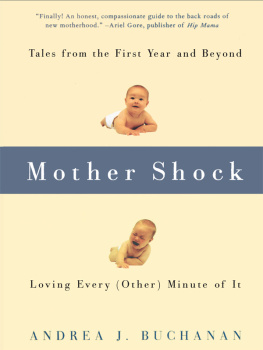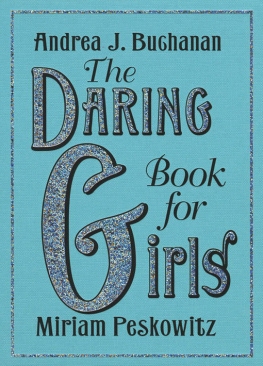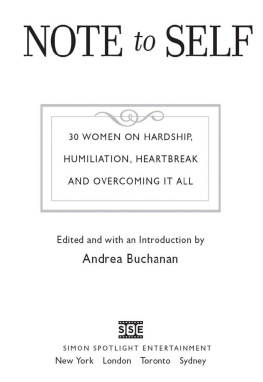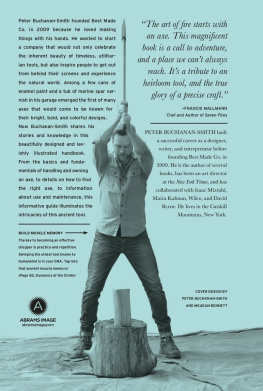2003 by Andrea J. Buchanan
All rights reserved. No part of this book may be reproduced or transmitted in any form without written permission from the publisher, except by reviewers, who may quote brief excerpts in connection with a review.
Introduction
I magine you have just moved to a foreign country. You have the worst case of jet lag ever. The guidebook you brought, which seemed so comprehensive before you left home, does not tell you everything you need to know. You do not yet speak the language, and everything is confusing. Your spouse or traveling companion either hasnt come with you or gets to go back home each morning, coming to visit you only at the end of the day. In this new place, the customs are very different. Your natural ways of behaving and interacting are no longer appropriate. Despite the newness of everything, in this particular country you are expected to adapt immediately. But the rhythms of life are different here, and you are constantly sleep-deprived. You miss your old life, where everything was familiar. You miss your friends back home, who only imagine the excitement of your travels and are unable to fully understand the difficulties you describe.
This is what it feels like for many of us when we become mothers: we find we have entered into a strange new world with a language, culture, time zone, and set of customs all its own. Until we become acclimated to this new, seemingly unfathomable territory, we exist in a state of culture shock.
We are in mother shock.
When I became pregnant, I scoured the Web for information. I read about women trying to have babies; women who battled infertility; women who were three months pregnant, six months pregnant, nine months pregnant; women who miscarried early; women who delivered late; women who loved being pregnant; women who hated it. I tested the Chinese Conception Calendar to predict my babys gender; I looked through the endless selections of baby names; I comparison-shopped for strollers. I signed up for e-mail newsletters detailing the rapid, invisible development of my in-utero guest. I posted on discussion boards and argued over parenting techniques with other women who were not yet mothers. I learned about Toni Weschlers Taking Charge of Your Fertility, Ferberizing, and the horrors of Ezzo and Bucknams Baby Wise. I discovered the bible that is Fieldss Baby Bargains. I enrolled in birthing class and began to watch the cable series A Baby Story. In short, I tried to do all the research I could and know everything there was to know about my biggest project to date: having a baby.
But then I had my baby. Suddenly I was in unfamiliar territory. Id had nine months to anticipate being a mother, and then about thirty seconds to snap into being one. When I eventually left the hospital, shell-shocked by the whirlwind of sleep-deprivation, two days of pre-labor, an excruciatingly epidural-free delivery, and the unbelievable reality of my baby in my arms instead of snugly lodged inside me, all I could think was: why does no one talk about this?
It wasnt just that the sun seemed so bright to me after being inside for two days, or that the cars driving past suddenly appeared to be death traps on wheels, or that the streets were full of grime and dirt I hadnt noticed before, or even that I saw the people around us as the germ-delivery systems they really were. It was that everything was fragile, everything was tenuous: I had crossed over to a strange new world, a world where another persons life literally depended on me, and everything seemed at the same time both more real and more unreal. I realized I had spent the past nine months learning how to be pregnant, not how to be a mother and being pregnant was the part that came naturally. Finally, after all my wondering, after all my preparation, after all my research, I had crossed over to the other side, and instead of being happy, I was in shock. Why had no one told me about this? Why had people been talking about slings and bouncy seats instead of telling me what motherhood is really like? Why had I never bothered to ask?
I had packed my bag for the hospital, but I ended up going on a much longer trip. I felt that in becoming a mother I had been transported to a foreign country with a whole new language, a different culture, a striking political landscape, and a punishing time zone to adjust toand this sense of being in a strange land was all the more jarring since, of course, I hadnt left home.
Suddenly I was allowed only a few nonconsecutive hours of sleep a night, yet I still needed to function normally to care for a tiny, incredibly loud baby who didnt speak my language. Suddenly I had to know how to interpret my babys cries, which in the beginning sounded merely like incessant screaming, not nuanced vocalizations full of clues as to what she needed. Suddenly I had to assume the mantle of responsibility for another humans life despite the fact that I barely felt responsible for my own. Suddenly I had to navigate my way through baby books, parenting articles, and advice from experts, grandparents, well-meaning friends, and complete strangers. Suddenly I had to be the one to know which was the safest, best, most baby-friendly stroller/car seat/highchair/sling/bassinet/baby food and where to find the cheapest/most environmentally friendly/ least politically offensive place to buy it. Suddenly I was supposed to be the authority on all things related to my child. I was a new citizen in a brand-new country, and not only was I supposed to be immediately acclimated to living there, I was supposed to be the President.
But although it seemed that my entire world had shifted in the course of one exhausting, joyous, eventful day, it didnt seem as though anyone else had noticed. I waited for that mythical maternal instinct to kick in, waited for someonea mother, my mother, any motherto acknowledge that yes, really, everything does feel different and new and difficult, and thats okay. But nothing kicked in aside from sleep deprivation, fear, and self-doubt, and what I heard was that newborns are easy, that mothering, at the beginning at least, is not that hard. So I suffered my culture shock in silence, and as I began navigating my new surroundings with my daughter in the world instead of inside me, I silently wondered why I couldnt cope as easily with that transition as I had with changes in my pre-maternal life.
My sense of emotional dislocation reminded me of what Id read about geographical dislocation: the phenomenon of culture shock and the general fish-out-of-water experience a person has when uprooted from her normal environment. So I did some research and discovered that the similarity between culture shock and what I was experiencing as a new mother was even more pronounced than I had imagined. The term culture shock was first coined nearly half a century ago by anthropologist Kalvero Oberg to describe the anxiety produced when a person moves to a completely new environment. In general, I learned, there are four phases to the adjustment cycle:













